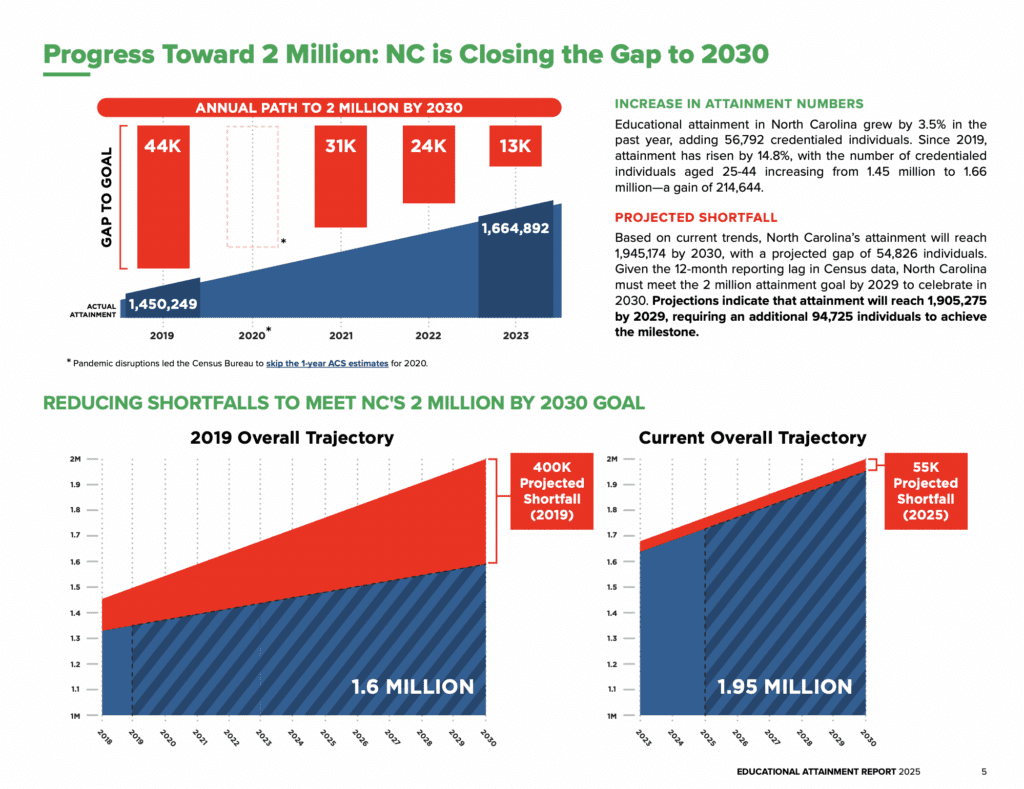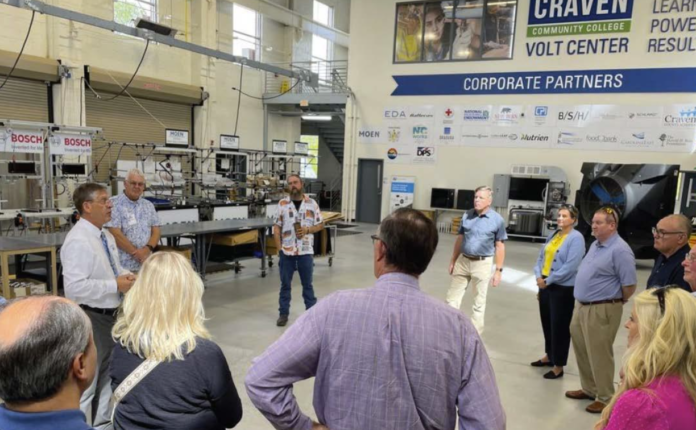When North Carolina’s attainment goal was unveiled in 2019, it was one of the most ambitious goals in the country — for 2 million North Carolinians aged 25-44 to hold an industry-valued credential or postsecondary degree by 2030.
On Feb. 20, myFutureNC, the statewide nonprofit organization focused on educational attainment, convened education, government, business, and nonprofit leaders to discuss North Carolina’s progress toward the statewide attainment goal.
Since 2019, nearly 215,000 additional North Carolinians aged 25-44 have earned a postsecondary degree or credential. That means 1.66 million adults in the state hold a degree or high-quality credential.
But the work is far from over.

When these efforts began in 2019, the state was projected to fall short of its goal by 400,000. The projected shortfall is now 55,000.
Despite North Carolina’s strong economy, which consistently ranks in the top three states for business, 85% of good jobs will require a degree or credential beyond high school. Recent data show that only 31% of public school ninth graders in North Carolina graduate on time and earn a college degree or certificate within six years of high school graduation, according to myFutureNC.
To identify gaps that make up the projected shortfall, myFutureNC tracks 18 key performance indicators, including early education, adult learner enrollment and completion, and education aligned with workforce needs.
These indicators show where students are falling out of the education-to-workforce continuum in what myFutureNC refers to as the Education Leaky Pipeline.
“While the 2030 goal may be state-led, we know that work must happen at the grassroots level,” Cecilia Holden, president and CEO of myFutureNC, said. “It must be locally owned and locally driven.”
To help local stakeholders determine additional ways to increase educational attainment by regions and counties, myFutureNC and Carolina Demography created attainment profiles. The profiles are designed to help facilitate conversations and decision-making among leaders regarding local priorities to advance educational and workforce outcomes.
Updated annually, the profiles highlight key education and workforce performance metrics at the county level and select regional levels, including prosperity zones, workforce development boards, and council of governments. The profiles also contain specific opportunities for growth.
Below is an example of North Carolina’s attainment profile for 2025.
Holden said data show that 79 of North Carolina’s 100 counties have increased their attainment rates since myFutureNC was established in 2019.
You can find county attainment profiles here.
Policy recommendations
During the convening, myFutureNC highlighted their 2025 policy recommendations to help North Carolina reach its attainment goal.
Those include:
- Scholarships for high-demand jobs that do not require a college degree and improved data tracking of these credentials.
- Comprehensive student supports and completion assistance grants to increase college graduation rates. This includes the expansion of programs like UNC System’s TrACE and North Carolina Community College System’s (NCCCS) BOOST.
- College transfer transparency including the augmentation of North Carolina’s new common digital transcript.
- The investment in community-driven solutions to increase educational attainment on the local level including funding for a dedicated project manager to support the goals of AdvanceNC.
- Support for existing legislative priorities that will help increase attainment including the NCCCS’ legislative request to implement a new funding model, Propel NC.
myFutureNC’s 2025 Champions for Attainment
myFutureNC honored the 2025 Champions for Attainment — a distinction awarded to individuals and organizations demonstrating outstanding dedication to expanding access, success, and completion for adult learners across North Carolina.
myFutureNC’s 2025 Education & Workforce Policy Attainment Champions
Additionally, seven state leaders were honored as Education & Workforce Attainment Policy Champions. The leaders were recognized for their “dedication and leadership in shaping North Carolina’s future through policies and initiatives that support the state’s attainment goal.”
Call to action
myFutureNC reports each year to the General Assembly on North Carolina’s progress toward the statewide attainment goal.
This year’s report notes that failing to meet the educational attainment goal has serious implications for the state, including a “skilled workforce shortfall, income inequality, limited upward mobility, reduced economic development opportunities, and policy implications.”
In his closing remarks, Gary Salamido, president and CEO of the NC Chamber and myFutureNC board member, reminded attendees that while progress has been made, the state is still “trailing where we need to be to claim victory in 2030.”
“It’s time to pull out all the stops,” Salamido said. “Let’s all recommit to doubling down in our intensity and in our work to ensure we are victorious in the second half.”
You can view the statewide educational attainment report and watch the virtual event recording below.





